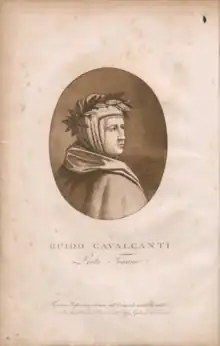Guido Cavalcanti
Guido Cavalcanti (1259 – August 1300) was an Italian poet from Florence.[1] He was the best friend of Dante Alighieri as well as an influence on his thinking.[2] Cavalcanti is one of the most important poets of Dolce stil novo,[3] and he is widely regarded as the first major poet of Italian literature.

Biography
Cavalcanti was born into a noble Guelph family; his father was Cavalcante de Cavalcanti. In 1267 he got married to Bice, daughter of Farinata degli Uberti, leader of the Florentine Ghibellines. In 1284 he became a member of the general council, together with Brunetto Latini and Dino Compagni.[4] On June 24 1300 he was exiled, so he went to Sarzana. On August 19 of the same year he could return in Florence, but he died after a few days, on August 29.
Works
Guido Cavalcanti wrote sonnets and ballads. Only fifty two poems by the poet are known today.[5] Hist best works are the canzone Donna mi prega (A lady asks me), the ballad I' prego voi che di dolor parlate (I ask you that speak about suffering) and the sonnet L’anima mia vilment’ è sbigotita (My soul is in distress).
Translations
Cavalcanti's poems were translated into English by Dante Gabriel Rossetti, Ezra Pound[6] and A.S. Kline.
References
- Guido Cavalcanti, Encyclopaedia Britannica.
- Ruud, Jay (2008). Critical Companion to Dante. Infobase Publishing. p. 417. ISBN 978-1-4381-0841-4.
- Guido Cavalcanti, Letteratura italiana.
- Cavalcanti Guido, Treccani, la cultura italiana.
- Lambdin, Laura C.; Lambdin, Robert T. (2013). Encyclopedia of Medieval Literature. Routledge. p. 83. ISBN 978-1-136-59425-0.
- The Sonnets and Ballate of Guido Cavalcanti (a selection).
Bibliography
- Sonnets and Ballate of Guido Cavalcanti with translations of them and an Introduction by Ezra Pound, Stephen Swift and Co. Ltd., London 1912.